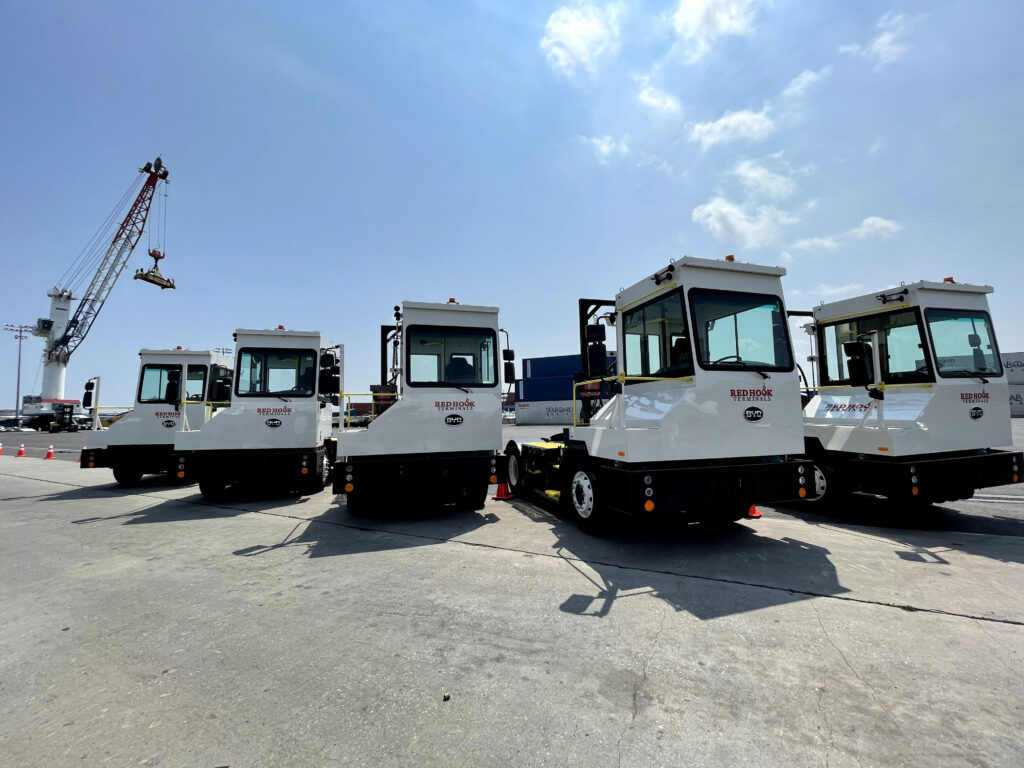Red Hook Container Terminal Announces Operating Performance Results for its Fleet of 10 Heavy-Duty Zero Emission Battery Electric Terminal Tractors
Single Largest Deployment of Heavy-Duty Zero Emission Terminal Tractors in Eastern United States; First Deployment at a Port Authority of NY and NJ Marine Terminal
Red Hook Container Terminals LLC announced the results of the first full quarter of operating performance data for its fleet of ten (10) BYD Motors heavy-duty zero-emission battery electric terminal tractors being operated at its container terminal in Port Newark, New Jersey. Red Hook’s electric fleet achieved an 81% decline in fuel costs and a 90% drop in climate altering CO2 emissions, compared to previous performance with diesel-powered vehicles. The Red Hook fleet represents the single largest deployment of zero-emission battery electric terminal tractors in the eastern United States and the first at a Port Authority of New York and New Jersey marine terminal.
“I am happy to report that the operating results for the BYD battery electric terminal tractors are truly outstanding,” said Mike Stamatis, President & CEO of Red Hook Container Terminal LLC. “We have recorded an 81% decline in fuel costs and a 90% decline in CO2 emissions, all while achieving 100% uptime of our terminal tractor fleet. The BYD terminal tractors and Amply Power control systems are both working perfectly. We are now pursuing additional emission reduction projects in Red Hook’s drive to net zero by 2025.”
The battery electric tractors are being used to move cargo containers at the Red Hook Marine Terminal in Port Newark, as well as to make runs to the other terminals at Port Newark and Port Elizabeth, and to run to the Millennium Marine Rail facility. The project was developed and is managed by Climate Change Mitigation Technologies LLC (CCMT), the leading New Jersey-based developer and manager of zero-emission truck and bus projects for public and private fleets.
“We have left the land of estimates and projections and crossed into the real world of digitally-monitored performance data. As the project developer and project manager, CCMT is ecstatic about the results, which actually exceed our expectations, which were pretty high in the first place,” said James Sherman, President & Chief Executive Officer of Climate Change Mitigation Technologies LLC. “The interesting thing to me is how much of the fuel costs and CO2 emissions are the result of idling emissions. Every port operator can achieve these same results right now.”
Managed charging, provided by partner AMPLY Power’s OMEGA software system, has been key to maintaining low fueling costs and ensuring vehicles are charged and ready to operate at the beginning of each shift. OMEGA optimizes charging for low costs while keeping the amount of electricity drawn at the site within peak load limits; the software also manages the charging operation to identify and resolve any problems that may otherwise go unnoticed.
“We’re so pleased to partner with Red Hook to help bring their vision of sustainable, environmentally-sound port operations to life, and are thrilled to help them achieve fuel cost reductions while doing so,” said Sean Larkin, Director of Sales and Business Development for AMPLY Power. “Many people worry about the costs of electricity, but as Red Hook has proven, electric vehicles can be cost-effective to fuel while also demonstrating reliable uptime, with no missed days of operations. It’s a win-win situation.”
“The Red Hook Terminal and the Port of Newark are a great proving ground for BYD’s advanced and innovative battery electric technology. These results show that a hard-at-work operation like the Red Hook Terminal, and the community it serves, benefits from eliminating carbon from our atmosphere,” said Patrick Duan, Senior Vice President Operations, BYD North America. “Congratulations to the Red Hook Terminal and Port of Newark for achieving these very positive results.”
Category: Electric Vehicles, Equipment, Featured, Fuel & Oil, General Update, Green, News, Products, Tech Talk, Transit News, Vehicles











